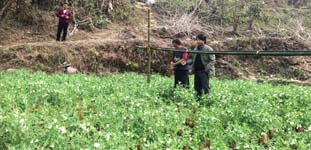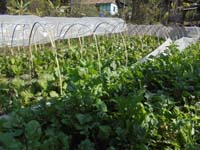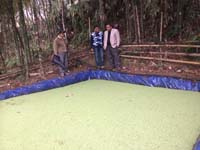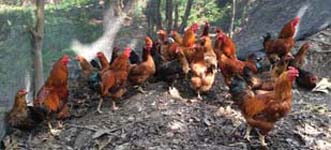
Shri Nim Tshering Lepcha, resident of Lower Nandok under 26 Naitam-Nandok GPU, East Sikkim had been practicing traditional agriculture in his 2 ha land as the only means of livelihood. Despite hard labour, the farm productivity was low and income was not satisfactory. But the interventions during last three years (2013-16) by Krishi Vigyan Kendra, ICAR Sikkim Centre, Ranipool, East Sikkim have transformed his socio-economic status.
Technological Interventions
Organic farming technological backup by ICAR Research Complex for NEH Region, Sikkim Centre made developmental interventions by providing training, on field demonstrations and input support. Various inputs/interventions were provided under National Innovations on Climate Resilient Agriculture (NICRA) with the purpose of reorienting his traditional farming into integrated organic farming system (IOFS) to increase the farm income. Major among these are Agri-polythene sheets (250 GSM) for the purpose of making Jalkund, micro-rain water harvesting structure; low cost plastic tunnels (transparent UV stabilized sheet of 45 GSM) for sequential vegetable cultivation, garden pea (TSX-10) under zero-till in rice-fallow rotation, cultivation of improved maize line RCM 1-1 and improved rice line RCM-10, backyard poultry production with Vanaraja and Hybrid Napier cultivation as fodder grass on terrace risers. Scientific management practices of fisheries with Grass carp and Common carp, milk cow crossbred Jersey and large cardamom cultivars Sawney and Varlangey were also introduced. Vegetables viz., cabbage var. Rare Ball, cauliflower var. Suhasini, broccoli var. Everest, tomato var. Arka Samrat, coriander var. Super Midori, spinach var. All Green, radish var. Chinese White were sequentially cultivated under low cost plastic tunnels. Jalkund, a life saving water reservoir designed with dimensions of 5 m x 4 m x 1.5 m (capacity of 30,000 l.) proved to be an indispensable tool in meeting the water requirement of crops through gravitational sprinkler irrigation system and encouraged the farmer to opt for diversification of the integrated organic farming system.



Impacts
Capacity building of the farmer coupled with his own competence, enthusiasm and institutional intervention raised his stature as progressive farmer in Integrated Organic Farming System within short span of time. Presently, Mr. Lepcha earns gross income of Rs. 4,15,050/- [(rice cultivation (0.25 ha) = Rs. 8,000; maize cultivation as green cob and grains (0.25 ha) = Rs. 9,500; sequential vegetable production (seasons/year) under plastic tunnel (0.05 ha) = Rs. 1,50,000; Rabi vegetables (zero till cultivation of garden pea and cole crops in 0.15 ha) = Rs. 12,500; large cardamom production (0.25 ha) = Rs. 45,000; milk production (2,880 l/year) = Rs. 75,800; backyard poultry (Vanaraja 100 nos.) = Rs. 63,750; fisheries (500 nos. Grass carp and Common carp) = Rs. 50,500] as compared to Rs.1,65,000 under traditional farming system. An expenditure of Rs. 89,750/- was incurred (excluding farming family energy input i.e., labour cost) for maintaining the integrated organic farming system, resulting in benefit : cost ratio of 4.6.
He is now a role model not only in his village but also for the entire farming community of East Sikkim. Farmers from other villages are motivated by the success of this farmer and headmen of neighbouring villages are encouraging farmers to implement similar model in their villages. These interventions have the potential to create positive impact on the utilization of scarce resources under the fragile mountain ecosystem benefitting the farmers at large.
In recognition of his achievements Mr. Nim Tshering Lepcha was felicitated by Sh. Khorlo Bhutia, Secretary, Food Security and Agriculture Development Department, Government of Sikkim as progressive farmer on the 40th Foundation Day of ICAR Research Complex for NEH Region, Sikkim Centre, Tadong in 2015.







फेसबुक पर लाइक करें
यूट्यूब पर सदस्यता लें
X पर फॉलो करना X
इंस्टाग्राम पर लाइक करें